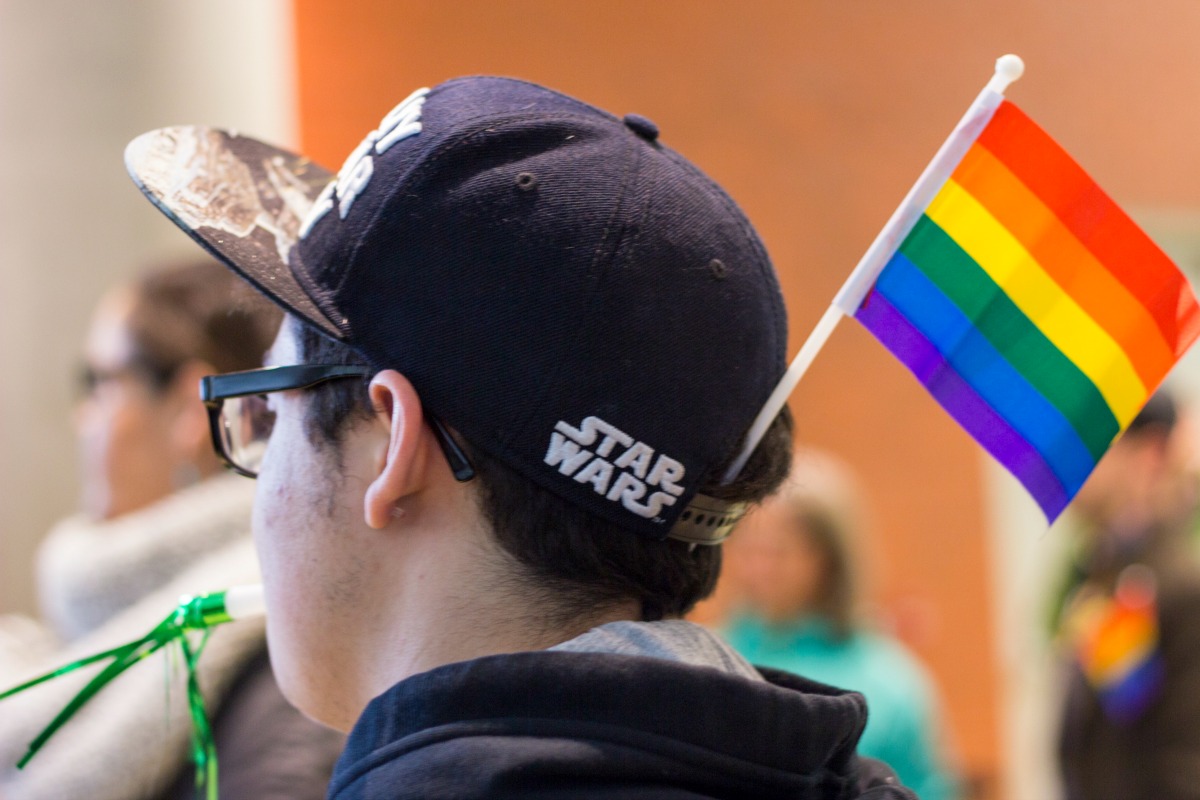Gay-straight alliances (GSAs) and queer-straight alliances (QSAs) are peer support networks that promote welcoming, caring, respectful and safe learning environments for lesbian, gay, bisexual, transgender and queer (LGBTQ+) students and their allies.
But misconceptions about what they do and who they’re intended for stoke opposition that may make students, teachers and school administrators hesitant to support their creation, despite the legislative backstop provided by Bill 10, which mandates the formation of GSAs in any Alberta K-12 school where students want them.
Leaders at the University of Alberta say the work of starting, strengthening and sustaining GSAs is ongoing—and that Alberta owes it to other jurisdictions to blaze a path.
Alberta leads the way
“Alberta is now viewed as a leader in the country on LGBTQ issues—arguably we’ve gone from last place to first in a short period of time, and that’s in large part due to inclusive government legislation and increased support for LGBTQ+ policies and resources,” says Kristopher Wells, faculty director with the University of Alberta’s Institute for Sexual Minority Studies and Services (iSMSS) and a professor of educational policy studies in the Faculty of Education.
“We only have to look at the amount of entrenched resistance to Alberta Education’s efforts to foreground LGBTQ rights as a core component of what it means to live, learn and grow in our province to see there’s still a lot of work to be done.”
Research on GSAs is important in providing supporting evidence and guidelines to ensure the success of such groups in serving their school communities, says Wells. In fact, he adds, it’s needed not just within Alberta.
“We’re just the third province in the country to have legislation that requires schools to actively support students when they want to start a GSA. I think that’s where a lot of the demand for knowledge is coming from—now that this is a legal requirement, how do we best support students who want a GSA?” Wells says. “Other jurisdictions also want to learn from Alberta’s journey and make sure this knowledge is translated across the country.”
Building a provincial network
One key element of this ongoing research is the creation of an online information hub, the Alberta GSA Network, which enables students and teachers to access current resources and supports for starting, strengthening and sustaining GSAs in their own schools. Another key element is the creation of a provincial GSA coordinator role designed to help create networks, mobilize knowledge and connect people with supports in their local communities.
Lauren Alston, a U of A alumna who has worked in various capacities on iSMSS initiatives such as the Comprehensive Health Education Workers (CHEW) Project and Camp fYrefly, has been the provincial GSA coordinator since January 2016. She says her experience working with established and burgeoning GSAs bears out the research on their positive impacts.
“There’s a lot of research that’s shown increases in mental health and decreases in overall bullying when GSAs are present in school,” Alston says. “And once you speak to someone who is in a GSA, that’s when you can hear the importance of having GSAs in school. There are youth who have said GSAs have helped their mental health, or they’ve said it’s really saved their life.”
Supporting the formation and success of GSAs is all about listening to the students who want to want to change the cultures of their schools to eliminate homophobic and transphobic bullying for everyone’s sake, Alston says.
“It’s an empowering club and it helps youth become really great leaders who want to expand human rights for everyone,” she says. “They know the atmosphere of their schools—I can help them with the policy and research part.”
Broadening the scope of GSA support
Along with building the online GSA network, running a monthly GSA roundtable in Edmonton and connecting students and teachers with resources across the province, Alston is also responsible for organizing the fifth annual Alberta GSA Conference, a sold-out event for students and school staff happening Nov. 19 at Eastglen School in Edmonton.
Expanding the tent is always the aim of the conference. “This year’s conference will be bilingual, and one of our goals is to address one of the TRC Calls to Action and really include Indigenous understandings of sexual orientation and gender in our conference, because those understandings have been on this land since prior to colonization,” Alston says.
Since attracting around 50 participants in 2011, conference attendance has more than doubled each year to where this year’s instalment quickly reached its capacity of almost 500 registrants for its 32 workshops and various activities involving a wide variety of community organizations. Wells says topics under consideration will include creating spaces for GSAs in faith-based schools, as well as “intersectionality, allyship, two-spirit issues and the diversity within diversity.”
Wells says he expects this year’s conference to feature the same determination and unity that has characterized the drive for GSAs in Alberta for more than a decade.
“It’s student-led. It’s energetic. It’s one day for community to come together and share knowledge and take it back to where they live, and to keep that knowledge moving forward to make change,” Wells says. “A decade ago GSAs were few and far between, and were mostly found in high schools. Now there are many across the province and they’re moving all the way down to elementary schools. It’s clear—GSAs can and do save lives by transforming school cultures into open and inclusive spaces for everyone.”
Learn more about the Alberta GSA Network at albertagsanetwork.ca and find them on Facebook.
